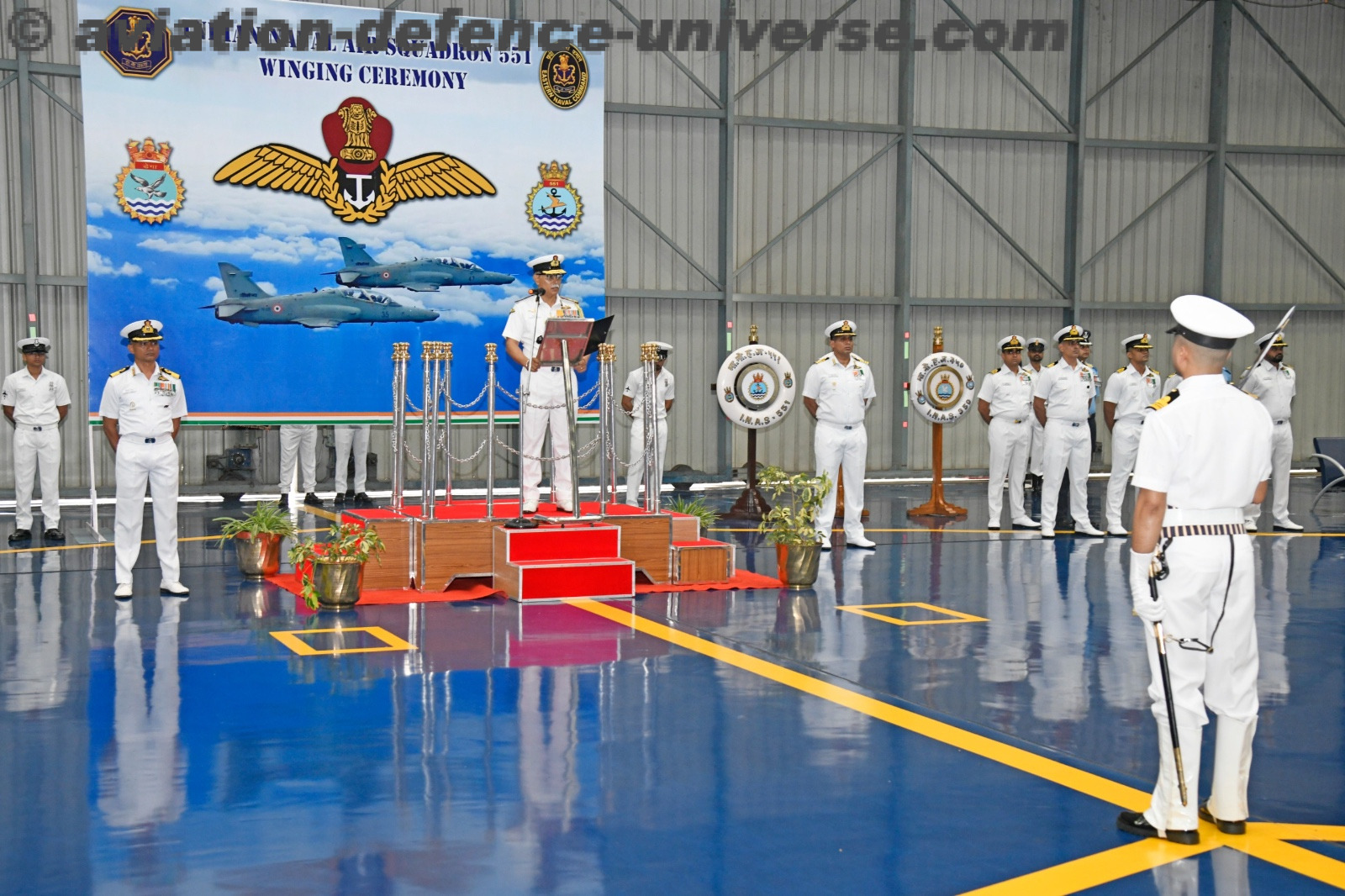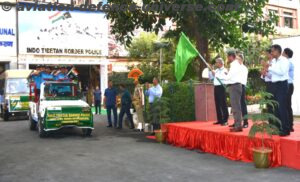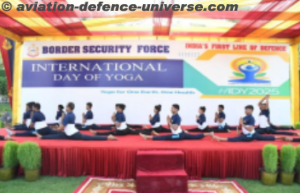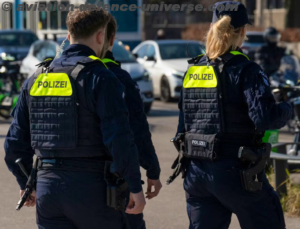By Sangeeta Saxena
New Delhi. 08 March, 2016. It was just the news to have come on International Women’s Day from a male dominated para military force. CISF while launching it’s raising day celebrations for 2016 broke the news that 33% of seats for constables will be reserved for women.
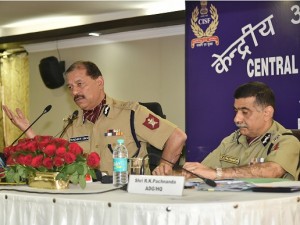 “CISF has the highest representation of women in all para military forces , at all levels, from constables to IGs. CISF has been able to achieve the target of 5% women in the force, as set by the government. 2 out of 9 IGs, 6 DIGs and 12 Commandants are women in the CISF officer cadre, at the moment. There has been no reservation for women in percentage till now, but all posts are open for women since 2008,” informed CISF Director General Surender Singh, during an annual interaction with journalists. This is good news for girls wanting to make their career in the para military forces.
“CISF has the highest representation of women in all para military forces , at all levels, from constables to IGs. CISF has been able to achieve the target of 5% women in the force, as set by the government. 2 out of 9 IGs, 6 DIGs and 12 Commandants are women in the CISF officer cadre, at the moment. There has been no reservation for women in percentage till now, but all posts are open for women since 2008,” informed CISF Director General Surender Singh, during an annual interaction with journalists. This is good news for girls wanting to make their career in the para military forces.
Elaborating on the force’s role in securing the vast coastline he stated that besides orientation on different aspects of port security, the CISF men are given training in handling boats and basic navigation skills.To enhance security of ports and economic installations in the post 26/11 scenario, the Navy has trained 600 CISF personnel to specially deal with security threats to such places from the seaside or waterfront. The three to four weeks training program, conducted in different batches, takes place at Chilka Naval Base in Orissa.
“Challenges and threats for CISF are extremely dynamic in nature due to diversity of deployment and kinds of training, skills and attitude differ accordingly .We at CISF try to ensure that we make the man most suitable for the job,” Singh said. We have a very capable and well equipped fire wing and a full-fledged fire training service institute. CISF has been permitted to do consultancy work since 1999 in both security and fire consultancy. It is the only CAPF which earns revenue for the government. 90% of our budget is not paid for by the tax payers. It is met by the clients or units where we are deployed. Security of the VIPs, government buildings and metro are being paid for by the government.
On being questioned about solving the slow or low promotion rates, he felt there is a need for cadre review to lessen the disgruntlement in the force created by lack of promotions for constables. “ There are bulges in the centre of the pyramid and the top is narrow. We need to have more entries at the bottom and then upward movement has to follow the pyramidal structure,” he felt.
The CISF secures 59 civil airports of the country at present and functions under the command of the Union Home Ministry. “There are 4800 men and women deployed at Delhi Airport and there are 6 Quick Reaction Teams at any given time, to avoid any chaos at the time of need as well as in routine,” the DG informed.
Securing the air space is also a task of which CISF is a part. The Delhi International Airport witnesses unidentified objects in its air space. Surender Singh informed that a total of 62 such incidents have been reported fromOctober 27 last year. The DG said the government will soon come out with “operational guidelines” to tackle such cases after a similar incident was reported late last year when a suspected drone-like object was spotted near Indira Gandhi International Airport (IGIA) runway.
In a recent development Civil Aviation Ministry has asked CISF not to raise “operational issues” regarding the sensitive Delhi airport directly with operator DIAL, but route them through the Bureau of Civil Aviation Security (BCAS). BCAS, which functions under the Ministry, is mandated to lay down standards and measures in respect of security of civil flights at international and domestic airports in India. The officials said there have been instances in the past when the force and the airport operators could not get on the same page on issues like grant of equipments to the security personnel and the new arrangement will put the onus on BCAS to decide either ways in a specified time limit.
The Ministry has also asked CISF to sign a MoU with airport operators all across the country as it does while being deployed in any other sector.
While CISF officials expressed surprise that normally they do not need permission from either BCAS or the operator while deciding on the calibre or number of weapons to be deployed at the airport, the equipments are always supplied by the operator in case of airports run under the public-private partnership model, as per the current norms.
Giving security to government installations is not the only task CISF has. The government amended the act after the 2008 Mumbai attacks to enable the CISF to provide security to private clients as well. Patanjali Food Park at haridwar, Electronics City (Bengaluru), Infosys campuses in Bengaluru, Mysore and Pune, Reliance Refinery and Petrochemicals in Jamnagar, Coastal Gujarat Power Ltd project executed by the Tata group in Mundra and the Tata Steel project based in Odisha’s Kalinganagar are the other private sector clients of the force. It will also take over security of the iconic Victoria Memorial in Kolkata along with six other government installations.
 “CISF has the highest representation of women in all para military forces , at all levels, from constables to IGs. CISF has been able to achieve the target of 5% women in the force, as set by the government. 2 out of 9 IGs, 6 DIGs and 12 Commandants are women in the CISF officer cadre, at the moment. There has been no reservation for women in percentage till now, but all posts are open for women since 2008,” informed CISF Director General Surender Singh, during an annual interaction with journalists. This is good news for girls wanting to make their career in the para military forces.
“CISF has the highest representation of women in all para military forces , at all levels, from constables to IGs. CISF has been able to achieve the target of 5% women in the force, as set by the government. 2 out of 9 IGs, 6 DIGs and 12 Commandants are women in the CISF officer cadre, at the moment. There has been no reservation for women in percentage till now, but all posts are open for women since 2008,” informed CISF Director General Surender Singh, during an annual interaction with journalists. This is good news for girls wanting to make their career in the para military forces.
 “CISF has the highest representation of women in all para military forces , at all levels, from constables to IGs. CISF has been able to achieve the target of 5% women in the force, as set by the government. 2 out of 9 IGs, 6 DIGs and 12 Commandants are women in the CISF officer cadre, at the moment. There has been no reservation for women in percentage till now, but all posts are open for women since 2008,” informed CISF Director General Surender Singh, during an annual interaction with journalists. This is good news for girls wanting to make their career in the para military forces.
“CISF has the highest representation of women in all para military forces , at all levels, from constables to IGs. CISF has been able to achieve the target of 5% women in the force, as set by the government. 2 out of 9 IGs, 6 DIGs and 12 Commandants are women in the CISF officer cadre, at the moment. There has been no reservation for women in percentage till now, but all posts are open for women since 2008,” informed CISF Director General Surender Singh, during an annual interaction with journalists. This is good news for girls wanting to make their career in the para military forces.































